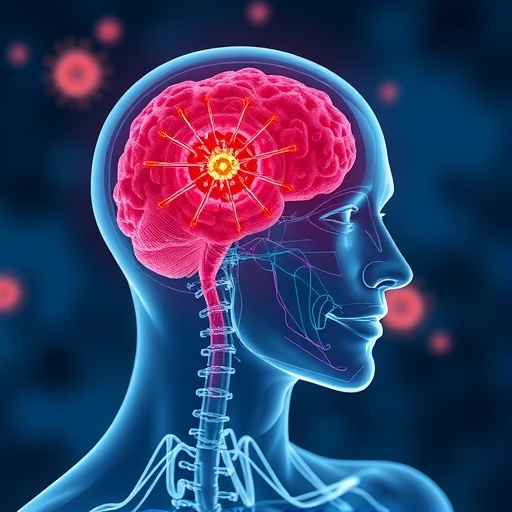The COVID-19 pandemic has profoundly impacted various aspects of our lives, from public health systems to personal routines. A recent groundbreaking study sheds light on another dimension of this crisis: its effects on pituitary function. Conducted in southern Iran, the research meticulously examined how the viral infection may have altered a vital component of our endocrine system—the pituitary gland. This research serves as a critical gateway to understanding the broader implications of COVID-19 beyond respiratory symptoms, particularly given the increasing recognition of the virus’s systemic effects.
The pituitary gland, often referred to as the “master gland,” plays a pivotal role in regulating many bodily functions by releasing hormones that act on other endocrine glands. Its influence reaches far and wide, affecting growth, metabolism, and reproductive health. Therefore, any disruption caused by an external factor such as a viral infection could result in cascading effects throughout the endocrine system, potentially leading to long-term health issues for affected individuals. Understanding this connection becomes vital in the context of the ongoing pandemic.
The researchers assembled a cohort of patients diagnosed with COVID-19 in a cross-sectional study format, aiming to determine whether the virus had a discernible impact on their pituitary hormone levels. Through a comprehensive evaluation of various endocrine parameters, they sought to ascertain the nature and extent of any such impact. The study was notably rigorous, utilizing advanced laboratory techniques to ensure the accuracy and reliability of the hormone level assessments.
Tellingly, the research team found varying degrees of hormonal dysfunction among the participants. Patients exhibited disrupted levels of key hormones such as growth hormone, prolactin, and cortisol, each of which plays a critical role in maintaining homeostasis in the body. These findings highlighted the possibility that COVID-19 may not only lead to immediate respiratory complications but also provoke long-term endocrine consequences that could manifest in myriad ways in survivors.
When COVID-19 first emerged, much of the focus was understandably placed on its acute symptoms, primarily respiratory distress. However, as the crisis unfolded, it became increasingly apparent that the virus could have intricate and far-reaching effects on multiple organ systems. This research underscores the importance of a comprehensive approach to patient care, demonstrating that healthcare providers must consider the potential long-term endocrine consequences of the infection in addition to its immediate threats.
The implications of these hormonal disruptions could be profound, particularly regarding metabolic health and quality of life for COVID-19 survivors. With a growing body of evidence linking endocrine dysfunction to conditions such as obesity, diabetes, and even mood disorders, the findings could help healthcare professionals provide a more nuanced understanding of the long-term rehabilitation needs of COVID-19 patients. Follow-up care may need to include regular monitoring of endocrine function, particularly in individuals presenting with symptoms that align with hormonal imbalances.
Moreover, the study highlights the necessity for further research into the underlying mechanisms through which COVID-19 affects pituitary function. This could pave the way for developing targeted interventions and treatment protocols designed to mitigate the adverse effects of such dysfunction. Understanding the pathways affected by the virus might also aid in identifying vulnerable populations who may benefit from closer monitoring and early interventions after infection.
To add complexity, the hormonal interplay revealed by the findings elucidates how interconnected our bodily systems are. The alterations in hormone levels may not just be direct consequences of viral activity but could also be secondary responses to the physiological stress the body experiences during an acute illness. For instance, the increased levels of cortisol—a stress hormone—could indicate heightened stress responses related to the illness, which in turn impacts pituitary function.
Investigators are now tasked with the critical responsibility of exploring the long-term trajectories of patients who exhibited hormonal changes post-COVID-19 infection. Future studies will likely require longitudinal designs that track the endocrine health of patients over time, allowing for a comprehensive understanding of how these disruptions evolve and whether they lead to chronic health conditions down the road.
As the global community continues to grapple with the ramifications of the COVID-19 pandemic, research like this serves as a reminder of the virus’s extensive reach into human health. It illustrates the necessity of recognizing the multifaceted nature of COVID-19, beyond its immediate respiratory implications. By fostering a holistic understanding of how such infections can disrupt critical bodily functions like those governed by the pituitary gland, we can better prepare for future health crises.
In conclusion, the additional focus on endocrine health in the context of COVID-19 points to an urgent need for integrated healthcare strategies in managing survivors of this virus. The results from the Iranian study provide a compelling case for a paradigm shift in our approach to treating the long-term effects of viral infections, emphasizing the importance of vigilance in monitoring and addressing hormonal health in patients recovering from COVID-19.
As we look toward the future, the implications of this study will reverberate throughout the medical community, ushering in an era where endocrine evaluations become standard in follow-up protocols for COVID-19 patients. The interconnectedness of our body systems demands that we adopt a more comprehensive perspective when dealing with the long-term consequences of viral illnesses. Adapting to this new understanding could ultimately lead to more effective health strategies, ensuring a better quality of life for those affected by the pandemic.
Thus, as research evolves and we gain a deeper insight into the complexities of COVID-19’s impact on human health, it is crucial to not only recognize the immediate threats posed by the virus but also to address its long-lasting effects on bodily functions that are crucial for overall well-being.
Subject of Research: Impact of COVID-19 on pituitary function
Article Title: Impact of COVID-19 on pituitary function: a cross-sectional study in southern Iran
Article References:
Sheikhi, S., Shirazi, F.K.H., Zamani, A. et al. Impact of COVID-19 on pituitary function: a cross-sectional study in southern Iran. BMC Endocr Disord 25, 261 (2025). https://doi.org/10.1186/s12902-024-01790-3
Image Credits: AI Generated
DOI: https://doi.org/10.1186/s12902-024-01790-3
Keywords: COVID-19, pituitary function, endocrine health, hormonal imbalance, long-term effects




